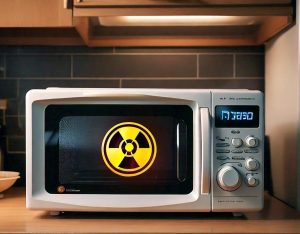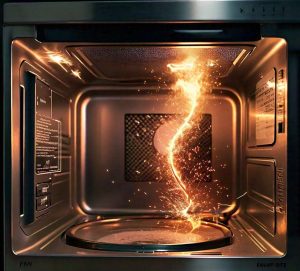A microwave oven is a common household appliance that heats food by producing radiation, which excites water molecules and produces heat.
The question at hand is whether or not these appliances might leak radiation.
This article discusses the potential for microwaves to leak radiation, providing an in-depth understanding of how microwaves work and their safety mechanisms. Alongside this main topic, we will explore related queries such as the impact of leaked radiation on health, signs indicating a leakage, prevention tips, and alternatives if your microwave appears to be leaking. We shall also address FAQs about microwaving food items and wrap up with some final thoughts. Despite being technical in nature, our focus will remain on creating accessible content to facilitate comprehension.

Jump To:
Can a Microwave Leak Radiation?
Absolutely, a microwave can potentially leak radiation. It’s crucial to note that microwaves generate electromagnetic radiation in order to heat food. Consequently, if the door seal or hinges are damaged, there’s a risk of these radiations escaping into the environment. However, under normal circumstances and with proper maintenance, leakage is highly unlikely. Moreover, the level of potential exposure is typically not harmful as most emissions are well below established safety standards.
Facts About Microwave Radiation Leakage
Here, we will discuss the important things to note about microwave radiation leakage.
- Type of radiation: Microwaves emit non-ionizing radiation which is not harmful in small amounts.
- Safety measures: Modern microwaves are designed to prevent leakage, ensuring safety during normal use.
- Radiation limits: The FDA stipulates that microwave ovens cannot leak more than 5 milliwatts of microwave radiation per square centimeter at approximately 2 inches from the oven surface.
- Detection methods: There are several methods and devices used for detecting leaks including using fluorescent light bulbs or specialized detectors.
- Harmful effects: Exposure to high levels of microwave radiation can cause burns and other injuries. However, such situations are extremely rare with domestic appliances.
In conclusion, this information presents a comprehensive overview of concerns pertaining to potential microwave leaks.
Now we will discuss some other things about microwaving.
What are the Alternatives to Microwaving?
There are numerous alternatives to using a microwave for heating food. Conventional ovens can be used, as they conduct heat evenly and often result in better flavor and texture. Using a stovetop provides direct heat which is suitable for cooking or reheating most foods. Another good option is a toaster oven, which combines elements of both ovens and microwaves but uses less energy than conventional ovens. Lastly, steaming preserves nutrients while safely heating food.
Tips for Safer Microwave Use
- Always ensure that your microwave door seals properly to prevent potential radiation leakage.
- Use only containers labelled as ‘microwave safe’ because some materials can warp or melt under high temperatures.
- Do not run the microwave empty; this could cause damage to it.
- Periodically check your microwave for damages such as worn gaskets or hinges that might lead to hazardous leaks.
- Finally, do some research on your specific make and model of microwave – it’s important to know its wattage and suggested cooking times.
In conclusion, concern about exposure from radiation leakages from microwaves needs cautious handling by undertaking safer practices like proper usage and maintenance.
In the following section, we will discuss frequently asked questions related to this topic.

Frequently Asked Questions (FAQs)
We will now look at the most commonly asked questions related to microwaving and heating.
Can a microwave leak radiation?
Absolutely, a microwave can potentially leak radiation. However, it is crucial to note that this typically occurs only with old or damaged units. Microwaves are designed with safety features such as metal screens in the door panels to keep the energy contained inside them. Regular maintenance checks can ensure they function safely without any leakage issues.
Does heating food in a microwave destroy its nutrients?
No, heating food in a microwave does not necessarily destroy its nutrients any more than conventional cooking methods do. The duration of heat exposure and the amount of water used in cooking are more critical factors affecting nutrient loss. Hence using a microwave for quick heating could even preserve nutrients better by reducing cooking time.
Is it safe to stand near a working microwave?
Yes, it is safe to stand near a working microwave. Modern microwaves are built with protective interlocks and shielding which prevent harmful levels of radiation from escaping into your kitchen environment while they operate.
Are some materials unsafe for microwaving?
Certainly! Not all materials are safe for microwaving. Plastics marked “not microwave-safe”, non-microwaveable styrofoam containers and metals like aluminum foils can spark and cause fires when heated inside a microwave oven.
This concludes our frequently asked questions section about microwaving and heating.
Final Word
Microwave ovens have become indispensable appliances in our day-to-day lives due to their convenience and efficiency in heating food quickly. While concerns about radiation leaks or nutrient loss might arise, it is crucial to remember that they are designed with safety measures and do not inherently cause nutrient loss more than other cooking methods. Keep your microwave in good condition, follow the recommended usage guidelines and you can continue enjoying its benefits without worries.



